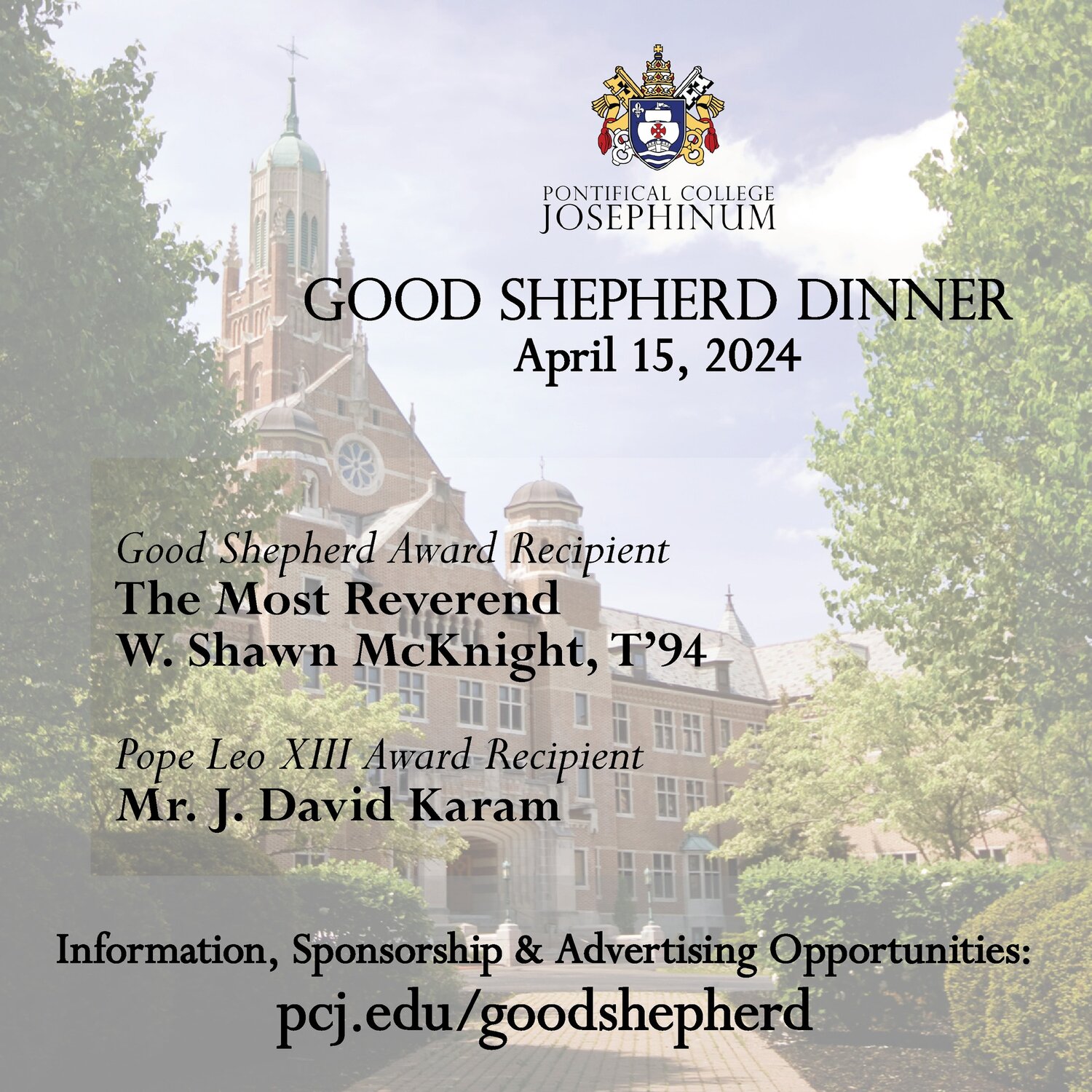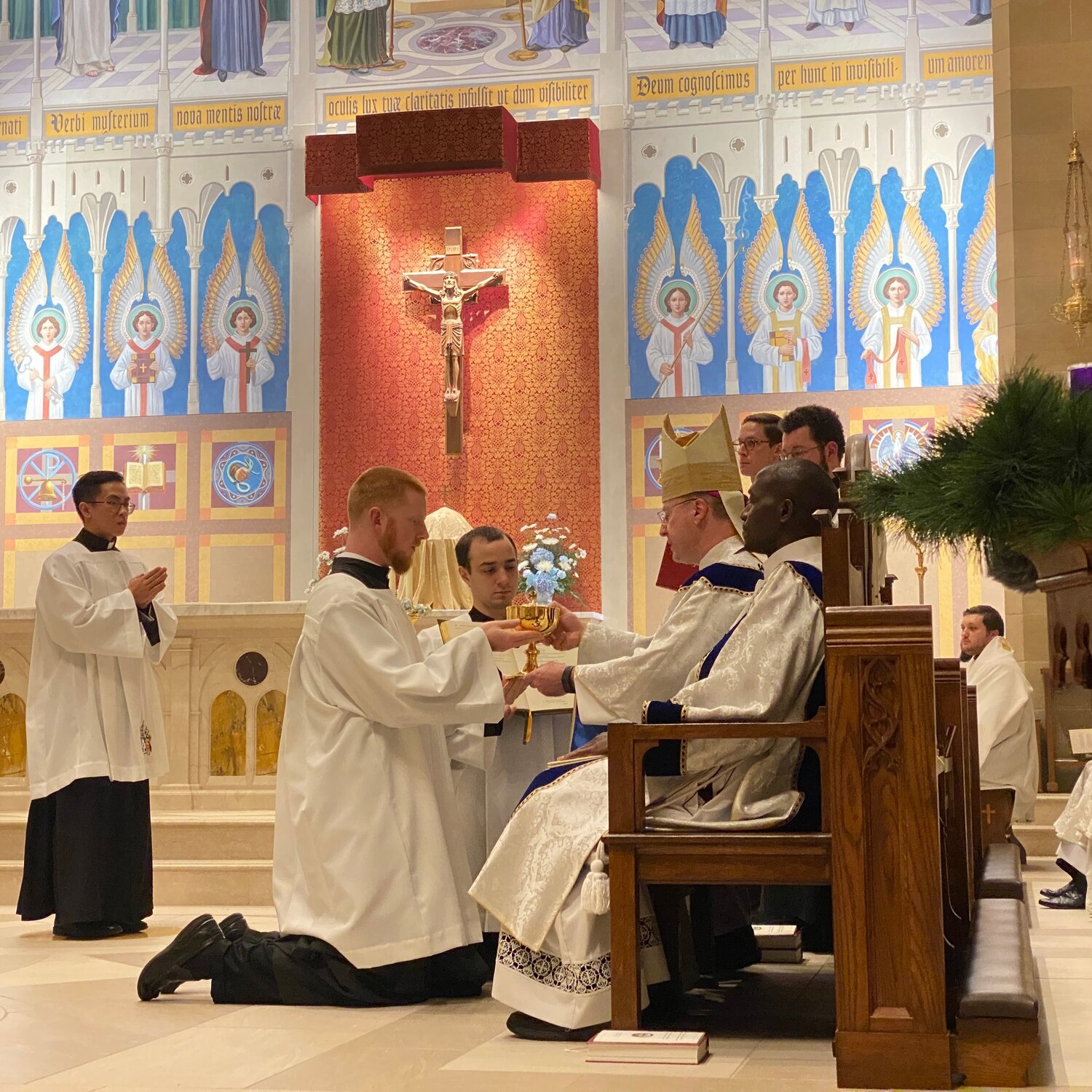Pontifical College Josephinum to present Good Shepherd Award to Bishop McKnight
Bishop says seminary helped form him in the ideals of Vatican II

SCROLL THE ARROWS to see more photos.
Much of what a student learns in school comes from observing his instructors inside and outside the classroom.
That’s how it was for Bishop W. Shawn McKnight at the Pontifical College Josephinum in Columbus, Ohio, where he prepared for Priesthood in the years leading up to his Ordination.
“Just to see how the priests on the faculty collaborated and worked as a team with the religious and the laity,” he recalled, “those are things that have an impact on you that you may not be aware of at the time, and only by looking back do you see their importance.
“Much as it is with our own parents — we don’t always appreciate the discipline, the fostering of the home environment, and how significant those things are until later in life,” he stated.
The Josephinum’s administration recently announced that it will honor Bishop McKnight with its 2024 Good Shepherd Award.
This is one of the two highest honors bestowed each year by the Josephinum, where Bishop McKnight also served on the faculty and administration and currently helps lead as a member of the board of trustees.
The award will be presented at the seminary’s Good Shepherd Dinner on April 15 in Columbus.
Father Steven P. Beseau, rector and president of the Josephinum, has known Bishop McKnight for over 25 years and believes the honors are well deserved.
“Bishop McKnight has demonstrated, through his own formation and his own passion for the ministry that he’s exhibited over the decades, a real love for the people, a real love for God, and the conviction that holiness is the ultimate goal for everyone — to be a saint,” said Fr. Beseau.
“Bishop McKnight exhibits that in his daily work, in his demeaner, in the decisions he makes, in his attitude and in the many ways he supports us now as a member of our board and as a sending bishop,” the rector stated.
The Jefferson City diocese now has three seminarians in formation at the Josephinum, preceded through the years by an impressive number of priests who were ordained for this diocese.
Bishop McKnight holds a Master of Arts degree and a Master of Divinity degree from the Josephinum and a Doctorate of Sacred Theology from the Pontifical Athenaeum of St. Anselm in Rome, writing on the permanent diaconate.
He was ordained for the Diocese of Wichita, Kansas, in 1994 after graduating from the Josephinum.
Following completion of his doctorate in Rome, he returned to the Josephinum to serve in various teaching, formation and administrative capacities.
As director of liturgy there in the early 2000s, he worked with Catholic architectural consultant Bill Heyer on plans to restore the seminary’s historical main chapel.
“The work didn’t actually take place until years later,” Mr. Heyer noted in 2022, “but a lot of his vision was incorporated into that project, and it turned out very well.”
Bishop McKnight then served as executive director of the U.S. Conference of Catholic Bishops’ Secretariat for Clergy, Consecrated Life and Vocations from 2010-15.
Upon completion of his term, he ministered as a pastor in Wichita until his episcopal ordination and installation as Bishop of Jefferson City in February 2018.
The people who selected him for the Good Shepherd Award noted that he has maintained throughout his Priesthood and into his Episcopacy solid ties to the Josephinum, most recently by accepting an invitation to join its Board of Trustees.
“He brings insight and perspective to our national identity and to the continued efforts of the Josephinum Diaconate Institute,” said Fr. Beseau. “We are grateful for his strong commitment to our mission, which he exhibits most visibly by entrusting seminarians of Jefferson City to us for their formation.”
Vatican II, through and through
Bishop McKnight noted that he had grown up as a member of St. Francis of Assisi Parish in Wichita. The longtime pastor there was Monsignor Thomas McGread, whose insights into drawing laypeople into full participation in the life of the Church helped him come to be known as the father of Catholic stewardship.
What Bishop McKnight then found as a seminarian at the Josephinum was a solid understanding of the diocesan priest as primarily a servant of those in the common Priesthood” — namely, all who are Baptized into the Church.
“And so, we had laypeople not only involved in our formation at the pastoral sites where we served and on the faculty but even in the governance of the seminary,” Bishop McKnight noted.
Lay men and women served then and now on the Josephinum’s board of trustees.
“That was very much ingrained in us, along with the understanding of the full, active participation of the whole assembly — not just the priest — in the liturgical act” — namely, the Mass, said Bishop McKnight.
Priests, religious sisters and brothers and laypeople collaborated well in forming the seminarians, he stated.
His coursework and discernment found him immersed in the documents and the teachings of the Second Vatican Council (1962-65), during which the world’s bishops and the magisterium sought to restore the early Church’s understanding of full participation by all of its members.
“That pretty much describes who I am and my perspective as a priest and now as a bishop,” said Bishop McKnight.
“House of Joseph”
Father John J. Jessing founded the Josephinum in 1888, primarily to prepare priests in the United States to serve the growing immigrant communities from Germany and throughout Europe.
Pope Leo XII (+1978-1903) granted it the status of the only pontifical seminary outside Italy — a distinction it retains.
Its motto is taken from Romans 8:31: “If God is for us, who can be against us?”
The seminary’s Fick Auditorium bears the name of a Rich Fountain native, Monsignor Leonard J. Fick, who served on the seminary’s faculty for decades after graduating there.
“I never got to know him personally, as he had retired by the time I was a student there,” said Bishop McKnight. “But I did hear a lot about him the entire time I was there.”
The bishop recalls processing with other seminarians out to the cemetery on Nov. 2 of each year to remember the seminary’s founders and deceased faculty members, and pausing to pray at Msgr. Fick’s burial place.
Microcosm for the Church
Bishop McKnight noted that seminaries are important places for men who are discerning a possible call to Priesthood to develop a strong sense of their calling under the guidance of competent formators.
“An individual’s internal discernment compliments the external discernment he receives from the Church through its agents at the seminary,” he noted.
“It takes time both to discern and to prepare to be formed and configured according to the template of Christ, the High Priest,” the bishop continued.
The seminary faculty is a microcosm of the whole Church, and in this case, “a very good model of clergy and religious and laity working well together,” he said.
Bishop McKnight was pleased to have spent time at the Josephinum observing and absorbing the vision of the Church that the fathers of the Second Vatican Council had put forth.
Namely, that he was preparing to become a priest who serves the common Priesthood of all Baptized Catholics.
Fr. Beseau said he’s proud of how that formation has carried forth into Bishop McKnight’s Priesthood and Episcopacy.
“He’s given over everything in his life to the service of Christ in his Church,” the rector stated. “It’s a real joy for us to be able to recognize that and honor it.”
Comments
Other items that may interest you
Services
The Catholic
Missourian
2207 W. Main St.
Jefferson City MO 65109-0914
(573) 635-9127
editor@diojeffcity.org

.jpg)

.jpg)





